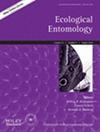Ecology of fear: ontogeny-mediated non-consumptive effects in a parasite–host system
IF 1.6
3区 农林科学
Q2 ENTOMOLOGY
引用次数: 0
Abstract




恐惧生态学:寄生虫-宿主系统中由本体中介的非消费效应
即使没有发生感染,寄生虫存在时也会产生非消耗性效应(NCEs),包括宿主行为、生理或形态的变化。我们利用黑腹果蝇-亚巴氏蝇-螨系统,研究了在蛹和成虫生殖前期接触寄生虫(未感染)的影响。首先,我们让蝇蛹间接接触螨虫(笼螨)或直接接触螨虫(自由游动的螨虫),以检验接触寄生虫对化蛹成功率的影响。其次,我们测试了在繁殖前将成年雌蝇暴露于螨虫对暴露后繁殖期的繁殖力有何影响。我们发现,与未接触螨虫的蛹相比,直接接触螨虫会显著降低成功羽化率(从蛹发育成成虫);但是,蛹的持续时间并未受到显著影响。间接接触对成功羽化率和蛹的持续时间都没有明显影响。我们还发现,间接接触(笼螨)的雌虫所产后代的数量明显减少,但这只发生在蛹羽化后的最初几天,这表明除螨后这种影响是可逆的。果蝇在蛹期和生殖前的生命阶段接触螨虫后会产生 NCEs,表现为羽化成功率和繁殖力下降。调查寄生虫在宿主不同生命阶段的相关NCEs,对于了解恐惧生态学及其对宿主整个生命周期的总体影响,以及对宿主本体发育和种群增长的影响非常重要。
本文章由计算机程序翻译,如有差异,请以英文原文为准。
求助全文
约1分钟内获得全文
求助全文
来源期刊

Ecological Entomology
生物-昆虫学
CiteScore
4.90
自引率
4.50%
发文量
94
审稿时长
3 months
期刊介绍:
Ecological Entomology publishes top-quality original research on the ecology of insects and related invertebrate taxa. Our aim is to publish papers that will be of considerable interest to the wide community of ecologists who are motivated by ecological or evolutionary theory. The suitability of a manuscript will usually be assessed within 5 days.
We publish full-length Original Articles as well as Reviews, Short Communications, Methods and Natural History papers. In Original Articles, we greatly prefer papers that test specific hypotheses and which have a high degree of novelty. All categories aim for innovative contributions that advance the subject of ecological entomology.
 求助内容:
求助内容: 应助结果提醒方式:
应助结果提醒方式:


